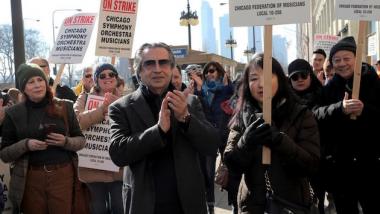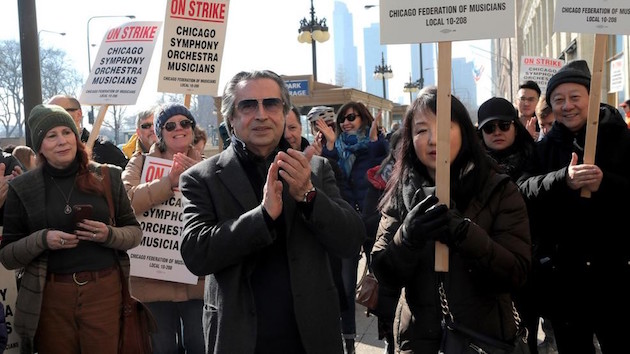
No news is not good news for the Chicago Symphony, out of business for the time being, or for its striking musicians, out of work.
As the calendar turns to a new month, the strike — started on March 10 — is going into its fourth week — with no solution in sight. There is continued deadlock in negotiations for a new labor agreement over salaries and pension benefits. What’s worse, there are no active negotiating sessions, only a series of cancellations.
Reports on Monday quote management calling the musicians’ demands “unreasonable,” while orchestra members warn that the board’s plans would hamper their ability to attract and retain high-level players.
A statement by the musicians’ negotiating committee is unchanged: “We have been clear from the beginning that we will not accept a contract that diminishes the well-being of members or that imperils the future of the orchestra.”
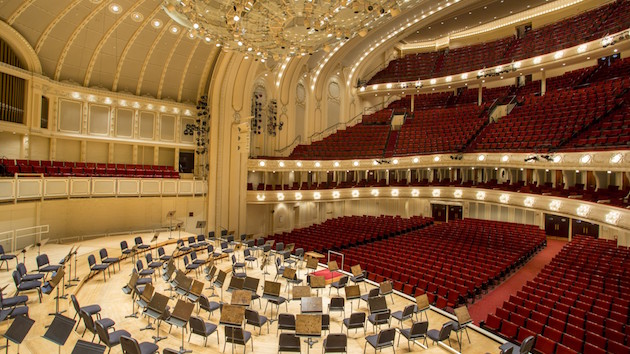
In the last Orchestra Association statement, CSOA President Jeff Alexander and Helen Zell, chair of the board of trustees, could only restate their “eagerness to sustain the excellent contract already in place for the musicians, while also securing a strong and healthy financial position for the CSOA.”
A spokesperson for the musicians painted a darker picture for SFCV:
CSO Management continues to propose replacing the traditional pension with a savings account and stagnating the wages of the best orchestra in North America whose compensation is falling further behind other orchestras, making it harder to attract the finest musicians and endangering the well-being of the musicians and sustainability of the orchestra.
A symphony labor negotiations expert, Drew McManus, sees the possibility of an extended strike:
Now that the CSOA is starting to cancel longer blocks of concerts, it shouldn’t be surprising to anyone if they begin increasing the number of days in subsequent cancellations.
Even though it’s only just starting to feel like spring, June is right around the corner and given the severity of the pension issue, it wouldn’t be surprising to see the rest of the regular season go dark unless both sides get back to the bargaining table.
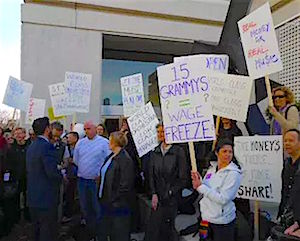
Lengthy strikes by major orchestras are rare, but they do exist, usually with serious consequences. San Francisco Symphony last left Davies Hall dark for an extended period during the 18-day work stoppage in 2013. A strike/lockout that almost killed the orchestra lasted 17 months in Minnesota.
CSO Music Director Riccardo Muti took the unusual step of supporting the musicians. With very few exceptions — such as Osmo Vänskä’s resignation as music director in sympathy with the musicians when the Minnesota Orchestra’s strike seemed unsolvable — music directors rarely take sides in labor disputes.
On the issue of salary, the Chicago Tribune reported that management offered for the current season an annual base pay of $163,818, just ahead of the Boston Symphony ($162,032) and New York Philharmonic ($153,490), and more significantly ahead of the Cleveland Orchestra ($140,556) and the Philadelphia Orchestra ($132,800), according to CSOA figures, but leaving Chicago behind 2017–2018 season figures for the San Francisco Symphony ($166,400) and Los Angeles Philharmonic ($164,476). (The new SFS contract will further increase the annual base pay to $185,640 by the end of the agreement in 2022.)
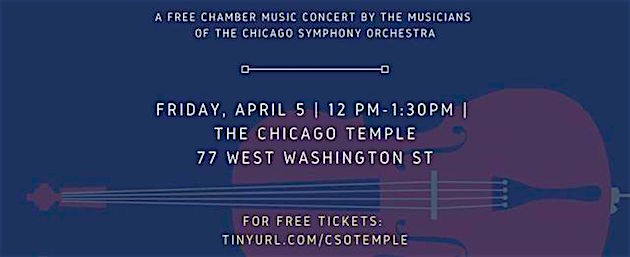
Meanwhile, the musicians in Chicago are giving free concerts in the community, playing to full houses in such venues as the Chicago Teachers Union Main Hall.
This week, the musicians keep busy with a Monday concert in the Benito Juarez Performing Arts Center, on Wednesday at Northwestern University, and on Friday in the Chicago Temple.

